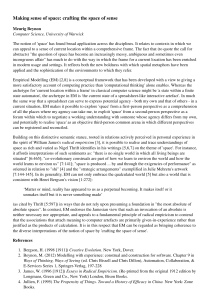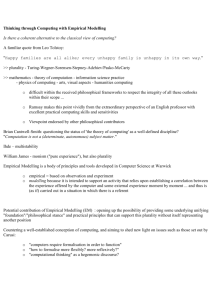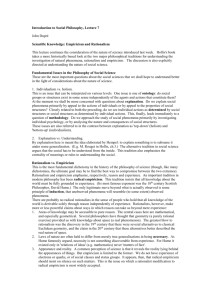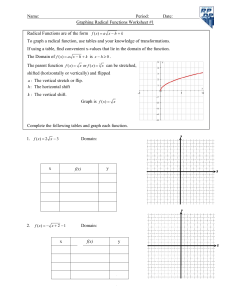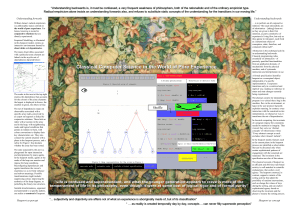Philosophy of Computing and the Information Sciences: a Jamesian perspective
advertisement
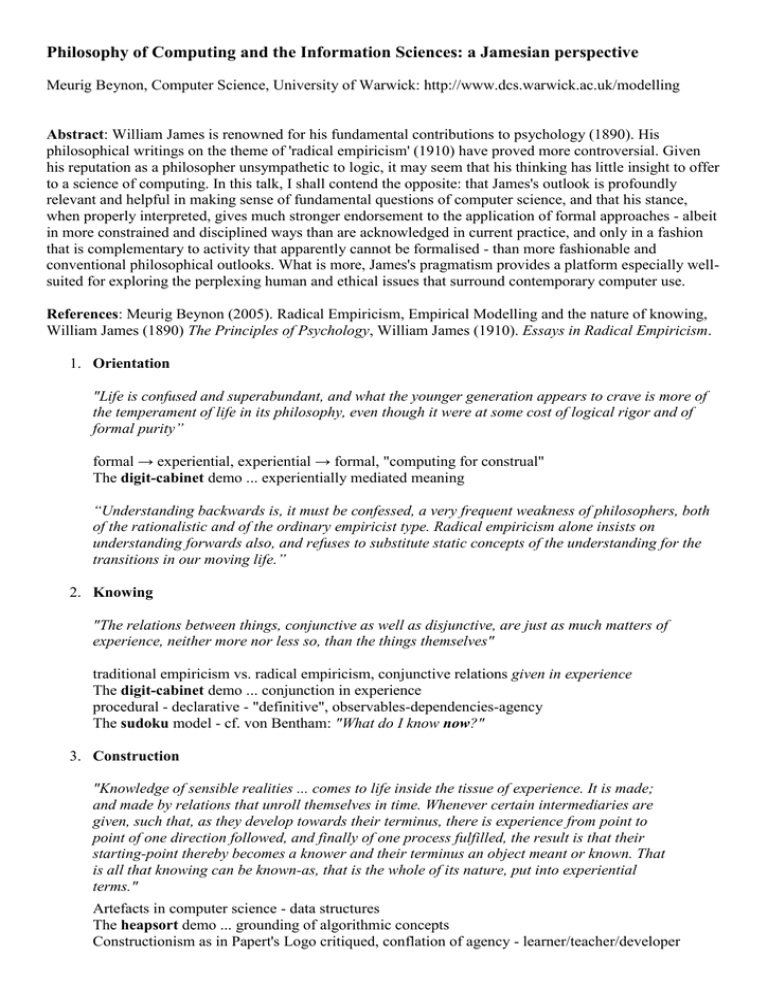
Philosophy of Computing and the Information Sciences: a Jamesian perspective Meurig Beynon, Computer Science, University of Warwick: http://www.dcs.warwick.ac.uk/modelling Abstract: William James is renowned for his fundamental contributions to psychology (1890). His philosophical writings on the theme of 'radical empiricism' (1910) have proved more controversial. Given his reputation as a philosopher unsympathetic to logic, it may seem that his thinking has little insight to offer to a science of computing. In this talk, I shall contend the opposite: that James's outlook is profoundly relevant and helpful in making sense of fundamental questions of computer science, and that his stance, when properly interpreted, gives much stronger endorsement to the application of formal approaches - albeit in more constrained and disciplined ways than are acknowledged in current practice, and only in a fashion that is complementary to activity that apparently cannot be formalised - than more fashionable and conventional philosophical outlooks. What is more, James's pragmatism provides a platform especially wellsuited for exploring the perplexing human and ethical issues that surround contemporary computer use. References: Meurig Beynon (2005). Radical Empiricism, Empirical Modelling and the nature of knowing, William James (1890) The Principles of Psychology, William James (1910). Essays in Radical Empiricism. 1. Orientation "Life is confused and superabundant, and what the younger generation appears to crave is more of the temperament of life in its philosophy, even though it were at some cost of logical rigor and of formal purity” formal → experiential, experiential → formal, "computing for construal" The digit-cabinet demo ... experientially mediated meaning “Understanding backwards is, it must be confessed, a very frequent weakness of philosophers, both of the rationalistic and of the ordinary empiricist type. Radical empiricism alone insists on understanding forwards also, and refuses to substitute static concepts of the understanding for the transitions in our moving life.” 2. Knowing "The relations between things, conjunctive as well as disjunctive, are just as much matters of experience, neither more nor less so, than the things themselves" traditional empiricism vs. radical empiricism, conjunctive relations given in experience The digit-cabinet demo ... conjunction in experience procedural - declarative - "definitive", observables-dependencies-agency The sudoku model - cf. von Bentham: "What do I know now?" 3. Construction "Knowledge of sensible realities ... comes to life inside the tissue of experience. It is made; and made by relations that unroll themselves in time. Whenever certain intermediaries are given, such that, as they develop towards their terminus, there is experience from point to point of one direction followed, and finally of one process fulfilled, the result is that their starting-point thereby becomes a knower and their terminus an object meant or known. That is all that knowing can be known-as, that is the whole of its nature, put into experiential terms." Artefacts in computer science - data structures The heapsort demo ... grounding of algorithmic concepts Constructionism as in Papert's Logo critiqued, conflation of agency - learner/teacher/developer 4. Grounding "... subjectivity and objectivity are affairs not of what an experience is aboriginally made of, but of its classification" / " … as reality is created temporally day by day, concepts ... can never fitly supersede perception" The heapsort demo ... discretionary behaviours, formal specification phases and invariants as observables 5. Language "[Suppose that each word names some discriminable item. Then] by this rule, every conjunction and preposition in human speech is meaningless. The truth is that neither elements of fact nor meanings of words are separable as our words are." artefact - construal - model - program "understanding backwards … [is to perform on all conjunctive relations] the usual rationalistic act of substitution – [taking] them not as they are given in their first intention, as parts constitutive of experience's living flow, but only as they appear in retrospect, each fixed as a determinate object of conception, static, therefore, and contained within itself” 6. The nature of agency "... the healthy thing for philosophy is to leave off grubbing underground for what effects effectuation, or what makes actions act, and to try to solve the concrete questions of where effectuation in this world is located, of which things are the true causal agents there, and of what the more remote effects consist" concurrency in EM, construing historic railway accidents declarative-procedural-definitive, Russell on agency 7. Pluralism “Experiences come on an enormous scale, and if we take them all together, they come in a chaos of incommensurable relations that we can not straighten out. We have to abstract different groups of them, and handle these separately if we are to talk of them at all. But how the experiences ever get themselves made, or why their characters and relations are just such as appear, we can not begin to understand." many perspectives, many notations, eclectic modelling, bricolage "Taken as it does appear, our universe is to a large extent chaotic. No one single type of connection runs through all the experiences that compose it. .... space-relations fail to connect minds ... Causes and purposes obtain only among special series of facts. The selfrelation seems extremely limited and does not link two different selves together. On the face of it, if you should liken the universe of absolute idealism to an aquarium, a crystal globe in which goldfish are swimming, you would have to compare the empiricist universe to something more like one of those dried human heads with which the Dyaks of Borneo deck their lodges. The skull forms a solid nucleus; but innumerable feathers, leaves, strings, beads, and loose appendages of every description float and dangle from it, and, save that they terminate in it, seem to have nothing to do with one other. Even so my experiences and yours float and dangle, terminating, it is true, in a nucleus of common perception, but for the most part out of sight and irrelevant and unimaginable to one another."
